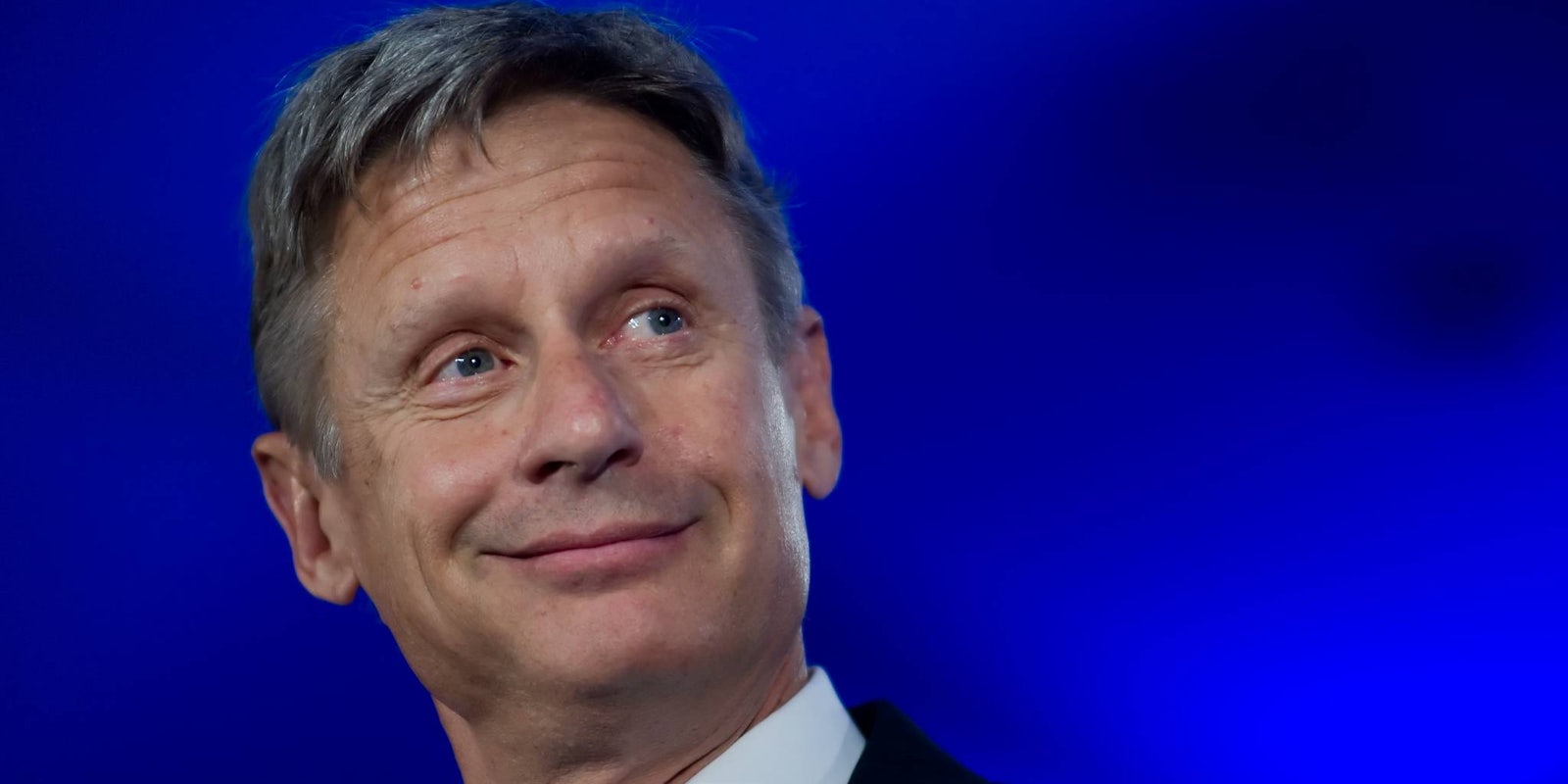Former New Mexico governor and Libertarian presidential candidate Gary Johnson was a guest on CNN’s State of the Union with Brianna Keilar on Sunday Morning. Johnson discussed a range of topics: his opinion of Republican nominee Donald Trump’s “racist” rhetoric, his belief in free trade, and his running mate, former Massachusetts governor Bill Weld.
Like every TV appearance for the Libertarian standard-bearer, it was something of a high-stakes affair because exposure is exactly what he needs. The rules for getting into the presidential debates dictate that Johnson and Weld would need to draw at least 15 percent support in five major polls heading in, which means they’re at the mercy of the pollsters as much as the voters. Unless the Johnson/Weld ticket gains enough visibility to convince polling firms to include them alongside Hillary Clinton and Donald Trump, then they won’t make the debates.
And unless they make the debates, any hope of a Libertarian moment in 2016 would probably be little more than a pipe dream. In other words, every major TV interview is a coup for Johnson, a chance for him to make his name and get his ideas out there.
Starting off the interview, Keilar asked Johnson what his path to the presidency was, and he replied that he wouldn’t be running if he couldn’t win, and that he believed Weld’s presence on the ticket would help “broaden that path.” Weld, who served two terms as Massachusetts governor, was a hugely popular, successful governor, admired both by Democrats and Republicans in his state.
As if to hammer the point home, Keilar played a clip of former GOP nominee (and a former Massachusetts governor in his own right) Mitt Romney, who said he’d be enthusiastic about voting Libertarian if Weld were at the top of the ticket, and might yet do so if he warmed to Johnson.
That’s obviously a slightly awkward compliment for Johnson to receive, but he seconded the sentiment, saying “people are really tuning in, you know, it’s really happening… fiscally conservative, over the top, two former Republican governors serving two terms, getting reelected by big margins in heavily blue states.”
Keilar went on to ask Johnson about the ongoing scandal and controversy surrounding Hillary Clinton’s use of a private email server, including former president Bill Clinton’s widely criticized private meeting with Attorney General Loretta Lynch last week, which both sides have characterized as a purely social chat.
Contrary to the kind of fire-breathing rhetoric the GOP has employed on these topics, however, Johnson was far more restrained ? he declined to say that Lynch should recuse herself, saying he’d “leave that judgment to others,” and said he didn’t believe Clinton acted with any “criminal intent.”
Johnson also dished his opinion on former Speaker of the House Newt Gingrich being on Trump’s VP short-list, stating that he had issues with Gingrich before going in on Trump himself, attacking the GOP nominee for his “racist” remarks and his absurdly implausible, inflammatory policy proposals:
Well, when it comes to Mexican immigration, and that he would call immigrants from Mexico murderers and rapists, look, that’s not true. They’re more law-abiding than U.S. citizens, and that is a statistic, and they’re not taking jobs that U.S. citizens want. The stuff he’s saying is just incendiary. … I mean, if you look up the definition of racism, calling a U.S. born Hispanic “Mexican” and his inability to judge others, I think I’m now semi-quoting Paul Ryan here.
Finally, Johnson touched on a topic slightly more in his wheelhouse from a policy perspective: the Trans-Pacific Partnership trade agreement. Both Trump and Clinton have come out against the TPP, although Clinton previously supported it; the latter drawing criticism over the perception that she changed her position to counter her far-left Democratic rival Bernie Sanders, who also strongly opposes it.
And, considering that Green Party candidate Dr. Jill Stein also opposes TPP, Johnson actually made some big news on this. He’s the only major 2016 candidate who’s on record in support of the TPP, saying that despite his skepticism of trade agreements more broadly, he believed it would “advance free trade.”
“I’m a real skeptic when it comes to these trade agreements, that in fact these trade agreements can be written with crony capitalism. But based on people that have been advising me, who I hold in very high esteem, I’m being told that the Trans-Pacific Partnership would in fact advance free trade, so I support that document.”
All in all, it was a wide-ranging interview, even if Johnson didn’t seem particularly animated, or full of zest. All the media hits and nationally televised interviews in the world won’t get Johnson where he wants to go if he can’t somehow break that 15 percent threshold and get into the debates, though.


